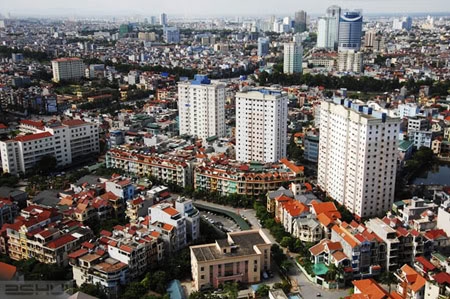World Bank critiques Vietnamese real estate market

Poor control of real estate pricing has led to rapid unplanned urban expansion
The World Bank (WB) said in its recent report on Vietnam’s urbanisation that with such high prices, only five per cent of Hanoi’s population could afford to buy land.
Dean Cira, WB’s Lead Specialist and Urban Sector co-ordinator, said the situation indicated the huge disparity between the government’s stipulated prices and market realities. Real prices are often up by 10 times higher than official prices.
Such a two-price system brings huge profits to real estate developers, investors, and brokers while seriously harming interests of landlords and end-users, Cira emphasised.
In addition, the processes of land allocation, settling of co-operation contracts, tax calculations, trading and licensing for real estate developers and investors are often based on seriously distorted prices, which are much lower than their transaction prices, creating a huge deficit to the state budget, the specialist noted.
Improper land pricing has fostered the fast development of real estate services, adding to incoherent rapid urban expansion and low-quality infrastructure.
According to the WB’s report, real estate prices in Hanoi and Ho Chi Minh City are much higher than those in several Asian cities.
Land prices are nearly 1,000 times higher than monthly rental prices for the same location.
Exorbitant land prices often lead to high leasing fees and higher sales prices in future transactions to help investors quickly recoup their initial investment.
Former director of the Ministry of Natural Resources and Environment’s General Department of Land Administration, Ton Gia Huyen attributed the high land prices to improper mechanisms and lax management.
He noted that many people earning money easily has added to real estate speculation and market manipulation.
Under the national master plan for urbanisation, Vietnam’s urbanisation rate will reach around 38 per cent by 2015. This means that the country will have over 870 urban areas of different sizes during the period, an increase of 125 from the current number.
Phan Thi My Linh, head of the Ministry of Construction’s Urban Development Agency, said that the rapid rate of urbanisation was outstripping local government control.
What the stars mean:
★ Poor ★ ★ Promising ★★★ Good ★★★★ Very good ★★★★★ Exceptional
 Tag:
Tag:
Related Contents
Latest News
More News
- Dong Nai experiences shifting expectations and new industrial cycle (January 28, 2026 | 09:00)
- An Phat 5 Industrial Park targets ESG-driven investors in Hai Phong (January 26, 2026 | 08:30)
- Decree opens incentives for green urban development (January 24, 2026 | 11:18)
- Public investment is reshaping real estate’s role in Vietnam (January 21, 2026 | 10:04)
- Ho Chi Minh City seeks investor to revive Binh Quoi–Thanh Da project (January 19, 2026 | 11:58)
- Sun Group launches construction of Rach Chiec sports complex (January 16, 2026 | 16:17)
- CEO Group breaks ground on first industrial park in Haiphong Free Trade Zone (January 15, 2026 | 15:47)
- BRIGHTPARK Entertainment Complex opens in Ninh Binh (January 12, 2026 | 14:27)
- Ho Chi Minh City's industrial parks top $5.3 billion investment in 2025 (January 06, 2026 | 08:38)
- Why Vietnam must build a global strategy for its construction industry (December 31, 2025 | 18:57)





















 Mobile Version
Mobile Version